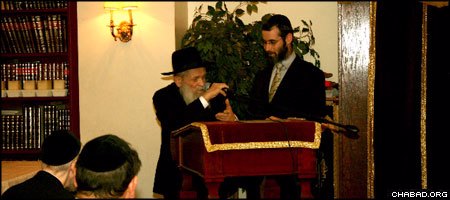At 92 years of age, Baruch Mordechai Lifshitz walked slowly to the podium at Chabad-Lubavitch of Midtown Manhattan. His back was slightly stooped and his beard was fully white.
But when he began talking, people in the audience were taken aback by the vibrancy and strength of this one-time Soviet prisoner’s voice. Speaking last month, years since being sent to Siberia for giving encouragement and assistance to Moscow’s Jewish community at the height of Communist oppressions, he sounded like a man on a mission.
With his grandson, Rabbi Levi Haskelevich of the Lubavitch House at the University of Pennsylvania, translating from the Yiddish, Lifshitz related for the crowd a few of his life’s experiences.
Born in Ukraine in 1916, Lifshitz – known affectionately in the Lubavitch community as Reb Mottel der Shochet, roughly Mottel the ritual slaughterer – entered the world amidst a revolution at home.
“When I was six years old, my father said it is time to go to religious school,” Lifshitz began. “My teacher was an old and bent-over man named Reb Faikin. There were only two other children in the class.
“One day, the police came and they said to our teacher, ‘What you’re doing is illegal! We are going to put you on public trial,’ ” continued Lifshitz. “At the trial, the prosecutor declared that our teacher had been corrupting us by teaching us Yiddish and the crowd reacted with a raucous round of applause to this accusation. Reb Faikin, being 90 years old, was allowed to go free on condition that he would no longer teach. Yakov Maizlik, a teacher at another school, was not so lucky. He received a two year prison sentence.”
As the years went by, Communism’s grip strengthened.
“When I was eight years old, the authorities tried forcing my father to send to me to Soviet schools,” said Lifshitz. “They felt that from the ages of eight to 10, the effects of their indoctrination worked best. So for two years, my father hid us at relatives’ houses. He kept moving us, so that they wouldn’t find us. When we turned 10, they finally stopped coming and we came out of hiding.”
As a teenager, he turned to welding to help provide for his family.
But when he was 21, the authorities arrested him on trumped-up charges of organizing illegal gatherings, teaching banned material, and consorting with the enemy. His crime, they told him, was spreading the teachings of his Rebbe, Rabbi Yosef Yitzchak Schneersohn, of righteous memory.
His interrogators made it clear that were after names of other Chasidim secretly working to strengthen the local Jewish community. They offered him a choice: Betray his friends or die in Siberia.
Lifshitz chose Siberia, spending a total of seven years in exile in the frozen wasteland around Kolyma. In previous interviews, he has termed his survival a miracle.
“The ground was frozen solid. You could not dig a grave for the dead,” he once told The Jewish Exponent, after speaking at Penn’s Lubavitch House. ‘The bodies of the dead were left for the bears. How does anyone survive such a place?”
Upon his release, Lifshitz went back to the activities that got him arrested in the first place, and studied to become a ritual slaughterer and circumciser. Even when opportunities arose in the 1970s to leave Russia, he stayed after receiving a secret communiqué from the Rebbe, Rabbi Menachem M. Schneerson, of righteous memory.
The Rebbe asked Lifshitz one simple question: “How are the people going to get kosher meat if you leave? How can you pass up the opportunity to help your fellow Jew?”
Rare Insight
He finally left in 1993, after making sure that others in Russia could take up his work and that the Rebbe approved of his move. A few years ago, Haskelevich helped publish Lifshitz’ Yiddish memoirs, Zichronos fun Gulag.
After the Midtown address, Haskelevich posited that his grandfather’s story offers an exceedingly rare insight into an almost forgotten era.
“Anne Applebaum, a writer at The Washington Post and author of Gulag, writes that in her travels in Eastern Europe, she found – much to her surprise – that Communist paraphernalia was readily available,” he said. “The sickle and hammer, symbols of a Communist regime that killed millions of prisoners in its forced labor system, had been raised to an unimaginable level of chic. From her findings, she deduced that the world’s comprehension of Soviet-era atrocities is thin to non-existent.”
The sentiment was confirmed by Israeli MK Yuli Edelstein, who remembered Lifshitz during his years in Moscow.
“We had gathered for a circumcision,” Edelstein told a recent group of students taking part in a Taglit-birthright israel tour of the Holy Land organized by the Lubavitch House and Mayanot. “Reb Mottel was walking towards the house where we had gathered, but he noticed suspicious activity around the house, so he kept walking.
“Just then, the KGB barged in and declared the meeting illegal,” continued Edelstein. “They took everybody’s names and left. Of course we were all scared to death, [but] just 15 minutes later, Reb Mottel showed up and did the bris. He was absolutely fearless.”




Join the Discussion